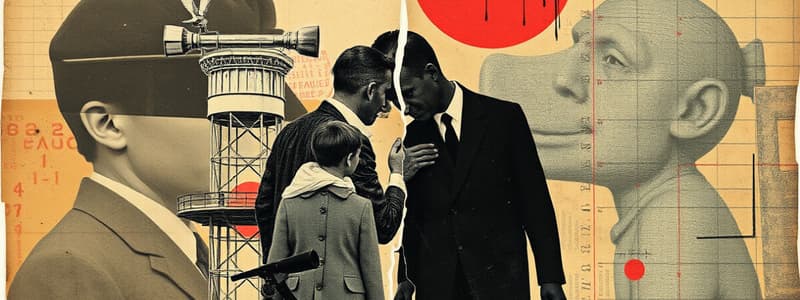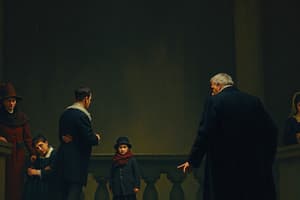Podcast
Questions and Answers
What does conflict theory suggest about the relationship between capitalism and crime?
What does conflict theory suggest about the relationship between capitalism and crime?
- All crime is violent in nature
- Crime is unrelated to economic status
- Crime is a result of unjust treatment by capitalism (correct)
- Capitalism eliminates crime
What significant social reforms did President Lyndon Johnson implement?
What significant social reforms did President Lyndon Johnson implement?
Reforms in civil rights, education, social programs, and rural development.
The Kent State Shootings were a peaceful protest event.
The Kent State Shootings were a peaceful protest event.
False (B)
What were the demands of the inmates during the Attica Prison riot?
What were the demands of the inmates during the Attica Prison riot?
What event is associated with Richard Nixon that indicated abuse of political power?
What event is associated with Richard Nixon that indicated abuse of political power?
According to conflict theory, crime is a result of the inequality of __________ and power.
According to conflict theory, crime is a result of the inequality of __________ and power.
Flashcards are hidden until you start studying
Study Notes
Conflict Theory
- Conflict theory posits that crime arises from the unjust treatment of capitalism, where marginalized groups engage in criminal activities due to unequal wealth distribution.
- Economic deprivation leads the poor to commit crimes like theft and robbery to meet basic needs they cannot afford.
- Violent crimes are expressions of societal anger and frustration, manifested through acts like arson and vandalism.
- Criminal laws predominantly favor the affluent, protecting their interests while restricting the economic opportunities of the poor.
- The wealthy influence legislation to maintain power, resulting in harsher penalties for crimes committed by the less fortunate.
The History of Social Conflict
- Post-World War II, there was a surge in expectations for equal rights and economic prosperity in the US.
- The 1960s saw the election of John F. Kennedy, bringing hope for societal improvements, but this diminished after his assassination in 1963.
- Lyndon Johnson, as Kennedy's successor, implemented reforms aimed at civil rights, education, and poverty reduction.
- Johnson's "war on poverty" faced public backlash, particularly regarding the US involvement in the Vietnam War.
- The assassinations of Martin Luther King Jr. and Robert F. Kennedy in 1968 fueled national unrest and social conflict.
More Riots
- The 1970s witnessed significant social conflict events, including public protests against the Vietnam War.
- Nixon's presidency faced backlash following the US invasion of Cambodia in 1970, which sparked nationwide protests, notably at Kent State University.
- The Kent State shootings on May 4, 1970, resulted in four student deaths and multiple injuries, highlighting tensions between government forces and protesters.
- Another critical event, the Attica Prison riot on September 13, 1971, involved inmates demanding better living conditions, leading to a violent confrontation where over 40 prisoners died.
Principle of Inequality
- Crime is viewed as a result of income and power inequalities, benefiting elite classes while disenfranchising the poor.
- Capitalism distorts power dynamics, with business magnates manipulating government and justice systems for profit.
- This manipulation fosters an environment where poorer sections feel compelled to commit crimes as a form of resistance or survival.
Nixon and the Watergate Scandal
- The Watergate scandal, beginning on June 17, 1972, involved a break-in by Nixon's associates at the Democratic National Committee headquarters.
- Initial public perception questioned Nixon's direct involvement, but he was reelected despite suspicions.
- Subsequent investigations uncovered that Nixon's reelection committee had orchestrated the break-in, revealing the misuse of political power for electoral gain.
- Allegations arose that Nixon offered hush money to those involved in the scandal, further evidencing the abuse of authority.
Studying That Suits You
Use AI to generate personalized quizzes and flashcards to suit your learning preferences.




